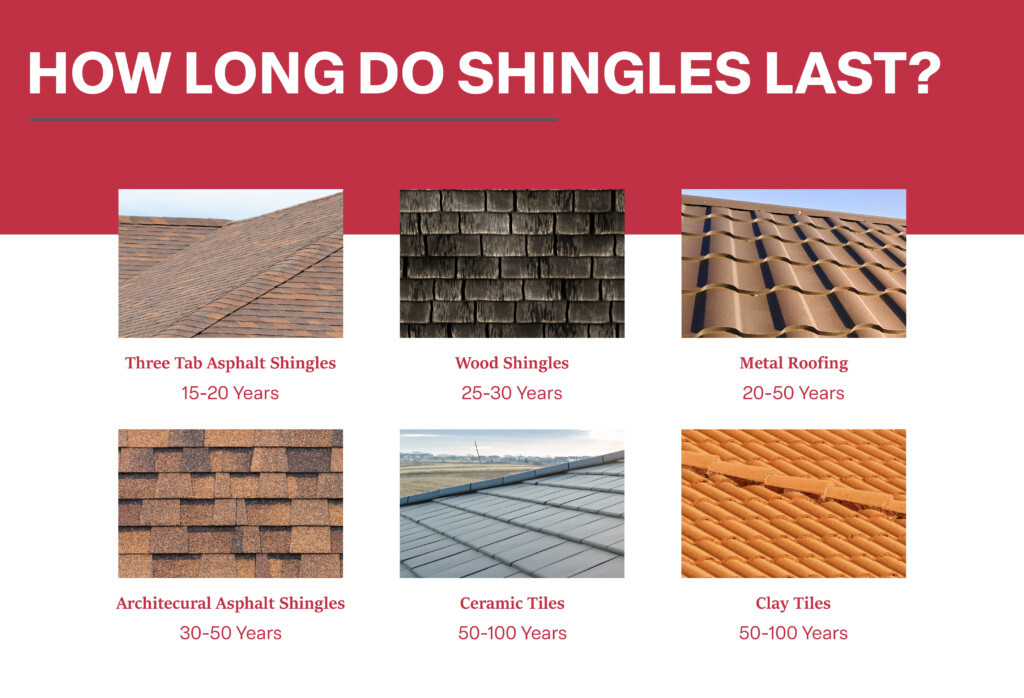How Long Does A Roof Last?
If you have ever wondered about the lifespan of your roof, you’re not alone. Your roof is one of the most important components of your home. It is your first line of defense against the elements and keeps your family safe and dry.
So, how long does a rooftop last? This is a question many people have asked. The short answer to this question is 25-50 years on average. However, the lifetime of your roof depends on several factors including:
- The environment you live in
- The type of materials used
- The quality of materials
- The quality of workmanship
- Ventilation
- Maintenance and upkeep of the roof

Environmental Conditions
The climate you live in can significantly impact the longevity of your roof. For example, the Midwest experiences drastic and irregular temperatures, along with extreme weather conditions. Constant temperature changes can cause splits and cracks in shingles. Storms and strong winds can loosen shingles or blow them off entirely. Hailstorms can cause dents and bruises in your shingles. This is why it is crucial to choose the highest quality materials available. Durability and longevity are important considerations for homeowners in regions prone to extreme weather.
Now that you have thought about what your wants and needs are, you can begin to consider the type of shingles that best suit your home. Choosing the right shingles for your home is a step in the right direction for improving your home’s roofing system.
Type of Materials
The type of roofing materials you choose can have a huge impact on your roof’s lifespan. For example, three-tab shingles may seem like a great option for people looking to DIY their roof, while Clay tiles seem like a better choice for people looking for a longer-lasting roof installed by professionals. D&G Roofing and Restoration recommends CertainTeed for all of your shingle needs!
Quality of Materials
In addition to the type of materials used, the quality of those materials is equally important. Investing in higher-quality materials reduces the frequency of repairs and extends your roof’s life expectancy. It’s always best to choose the highest quality materials to achieve a longer lifespan for your roof. Choosing a reputable roofing contractor grants you access to premium quality materials tailored to your specific needs.
Ventilation
When people think of their roofs, they often only consider the shingles. However, shingles are just the top layer of your roof. Your roof is made up of an entire roofing system, and when constructed correctly, it will have adequate ventilation.
Improper ventilation can lead to costly damage. Proper ventilation is key to improving your roof’s lifespan. Allowing air to flow in and out of the roof can help with the expansion and contraction of the shingles, reducing the risk of cracks or other damage to your roof.
Quality of Workmanship
Even the highest quality materials will not last long if not properly installed. Poor Installation can result in compromised shingles, water damage, structural damage, and more. This is why it is crucial to choose a contractor with a record of quality workmanship. Before choosing the company for your roofing project, ensure they have all the necessary qualifications, insurance, and liability coverage. Reading Reviews can also help you choose an honest, dependable contractor.
Maintenance
Regular maintenance is another key factor in extending the lifespan of your roof. Routine Inspections, debris removal, and prompt repairs prevent minor issues from escalating to major headaches. Scheduling annual roof inspections and promptly addressing any problem areas can save you significant time, money, and effort.
Tips for Maximizing Roof Lifespan
While you eventually will need to replace your rooftop, there are a few steps you can take to help increase your roof lifespan.
- Perform regular maintenance: Consistent care such as removing debris and regularly cleaning out your gutters can extend the longevity of your roof.
- Get your roof inspected once a year: Scheduling an annual inspection can assist in detecting and resolving small issues before they become major problems.
- Choose the right color shingles for your environment: Choosing shingle colors suited for your environment can help minimize external heat absorption extending the lifespan of your roof.
- Choose an experienced roofing contractor: Partnering with an experienced roofing contractor to inspect your roof, make repairs, and eventually replace is important to ensuring quality workmanship.
How Often Should I Replace My Roof?
While a rooftop typically has a life expectancy of 25+ years you may have to consider replacing your roof before that time. If you are experiencing
- Damage To Roofing Materials
- Leaking
- Water Damage
- Water Stains on The Ceiling
- Visible Damage
- Pests Inside Your Home
While these problems may seem small at first, they can lead to extensive damage that compromises your home’s structural integrity. Once you start approaching the end of your roof’s life expectancy, pay close attention to signs of aging and damage. Taking precautionary measures like saving and performing regular inspections ahead of time can help you be more prepared and avoid unexpected roofing emergencies.
How Long Does A Roof Last?
If you are wondering about your roof, its lifespan, and when you should replace it call D&G Roofing and Restoration today to speak to an experienced roofing project consultant. Our team believes in providing great customer service and superior craftsmanship.

